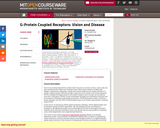
How do we communicate with the outside world? How are our senses of vision, smell, taste and pain controlled at the cellular and molecular levels? What causes medical conditions like allergies, hypertension, depression, obesity and various central nervous system disorders? G-protein coupled receptors (GPCRs) provide a major part of the answer to all of these questions. GPCRs constitute the largest family of cell-surface receptors and in humans are encoded by more than 1,000 genes. GPCRs convert extracellular messages into intracellular responses and are involved in essentially all physiological processes. GPCR dysfunction results in numerous human disorders, and over 50% of all prescription drugs on the market today directly or indirectly target GPCRs.In this course, we will discuss GPCR signal transduction pathways, GPCR oligomerization and the diseases caused by GPCR dysfunction. We will study the structure and function of rhodopsin, a dim-light photoreceptor and a well-studied GPCR that converts light into electric impulses sent to the brain and leads to vision. We will also discuss how mutations in rhodopsin cause retinal degeneration and congenital night blindness. This course is one of many Advanced Undergraduate Seminars offered by the Biology Department at MIT. These seminars are tailored for students with an interest in using primary research literature to discuss and learn about current biological research in a highly interactive setting. Many instructors of the Advanced Undergraduate Seminars are postdoctoral scientists with a strong interest in teaching.
- Subject:
- Biology
- Natural Science
- Material Type:
- Full Course
- Provider:
- M.I.T.
- Provider Set:
- M.I.T. OpenCourseWare
- Author:
- Kota, Parvathi
- Date Added:
- 01/01/2007



